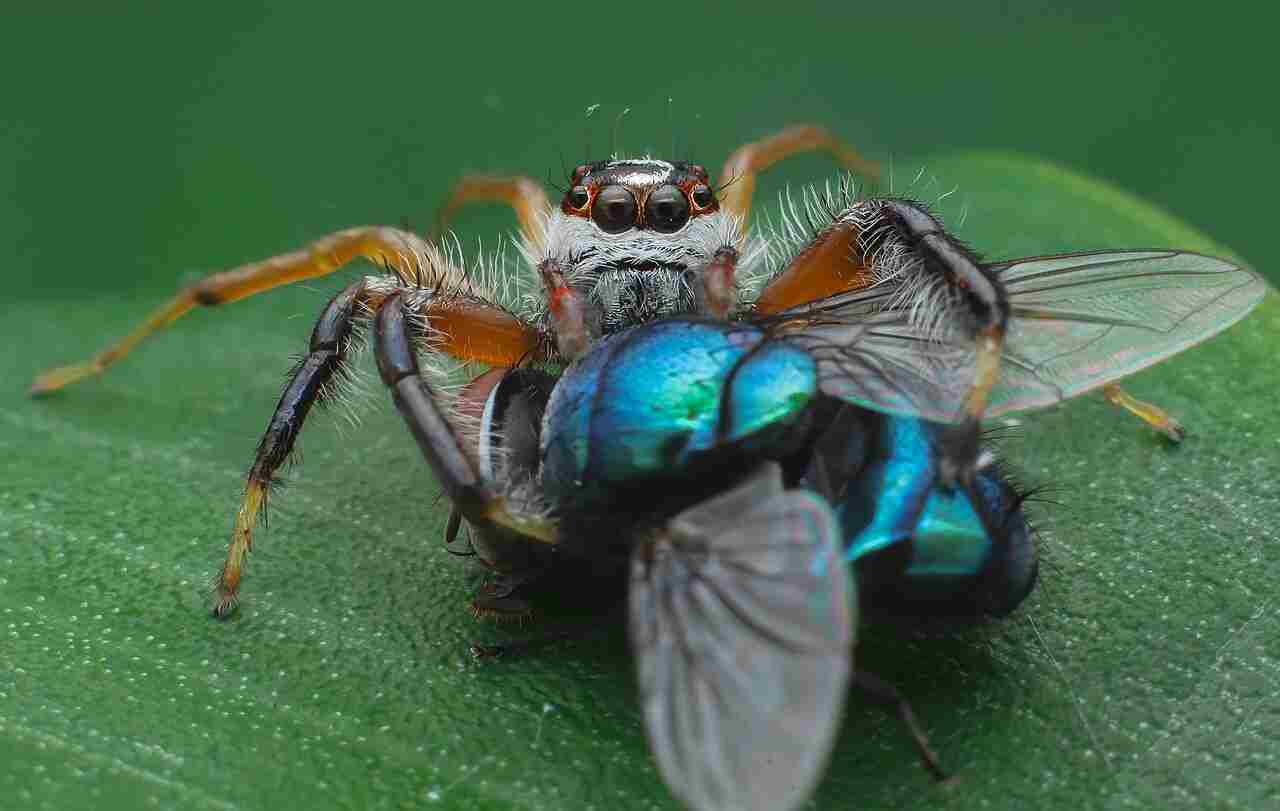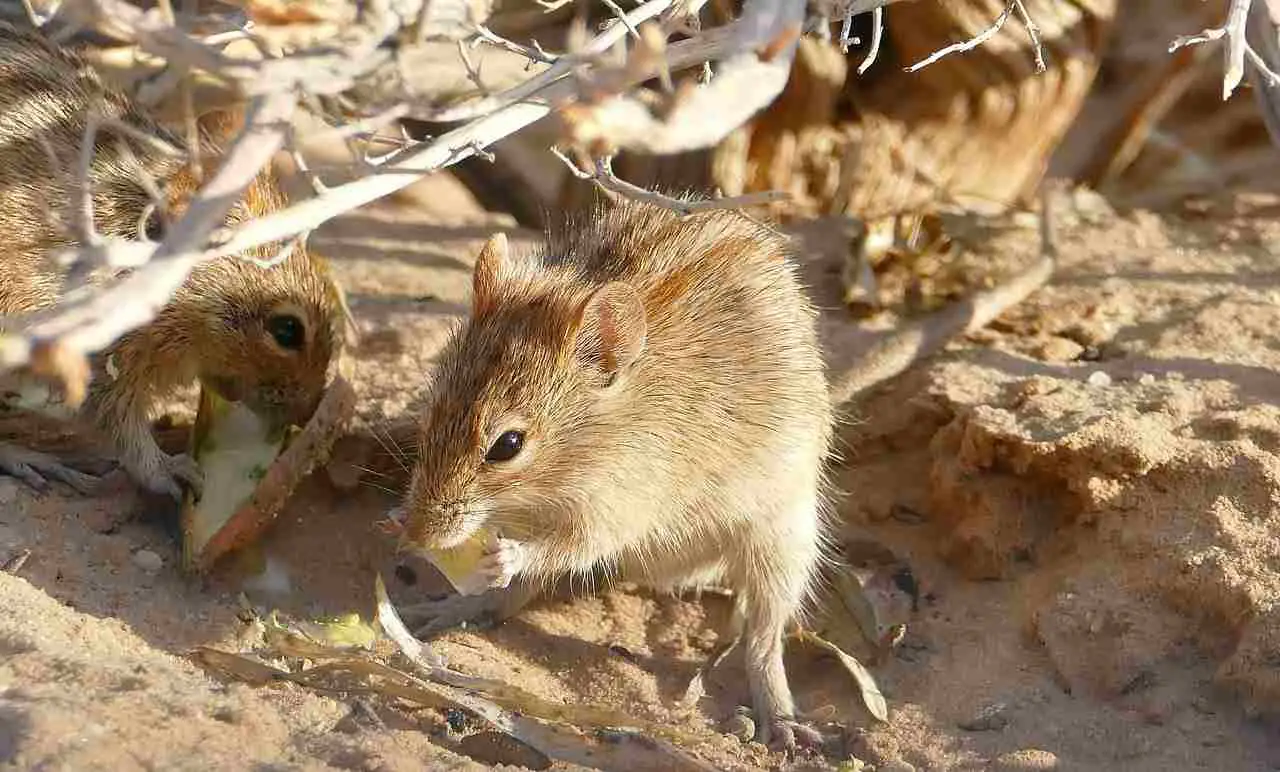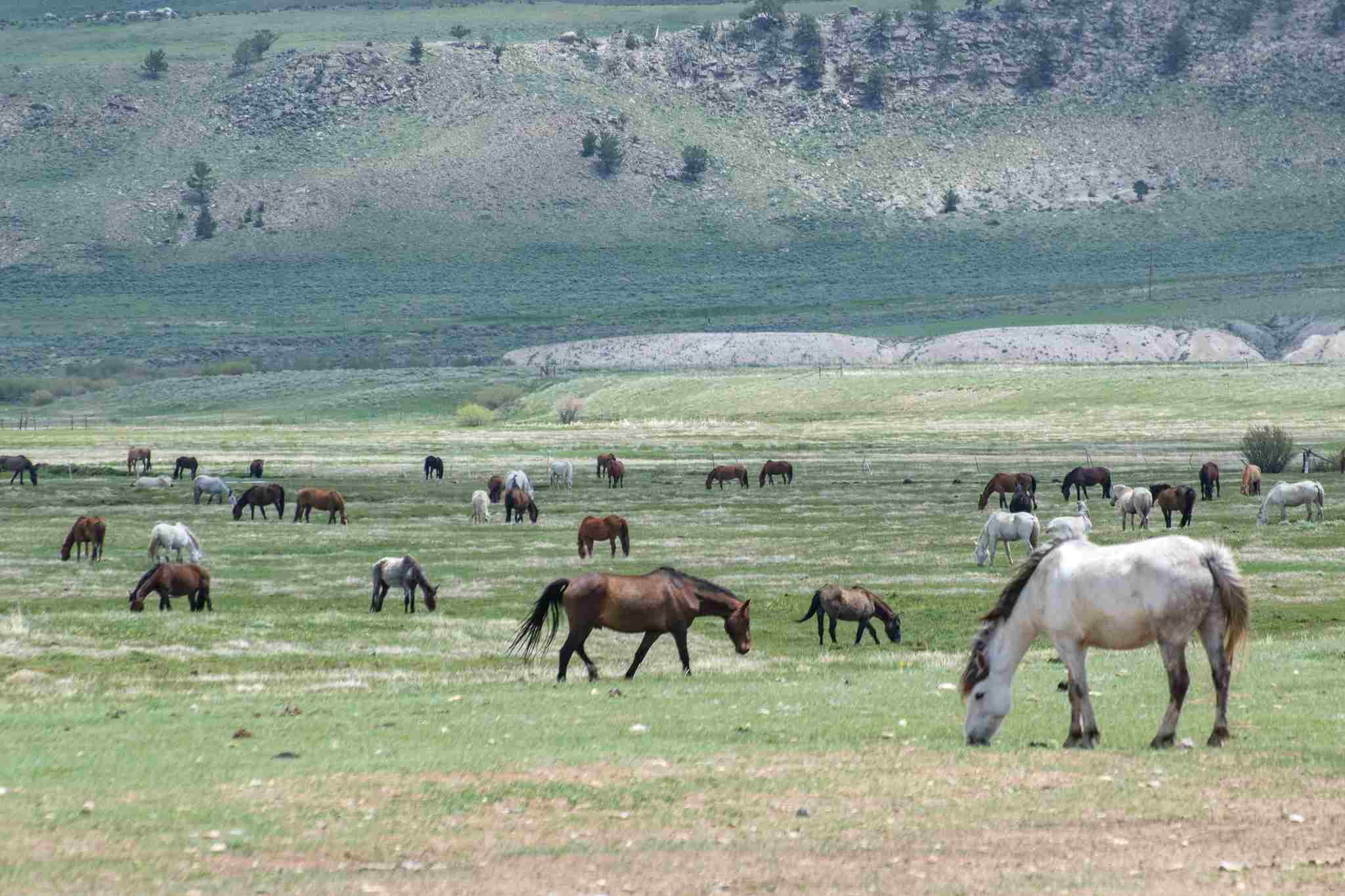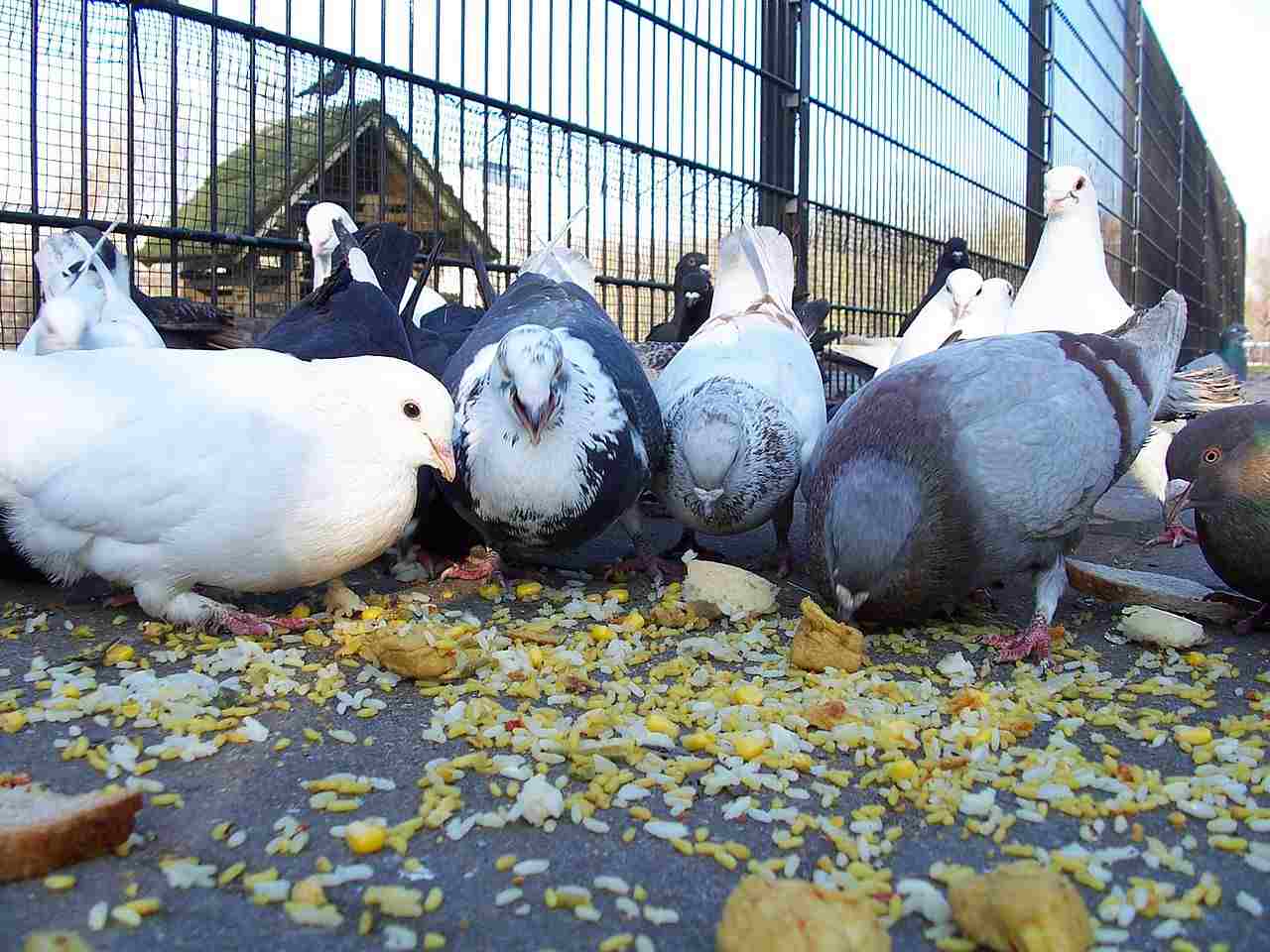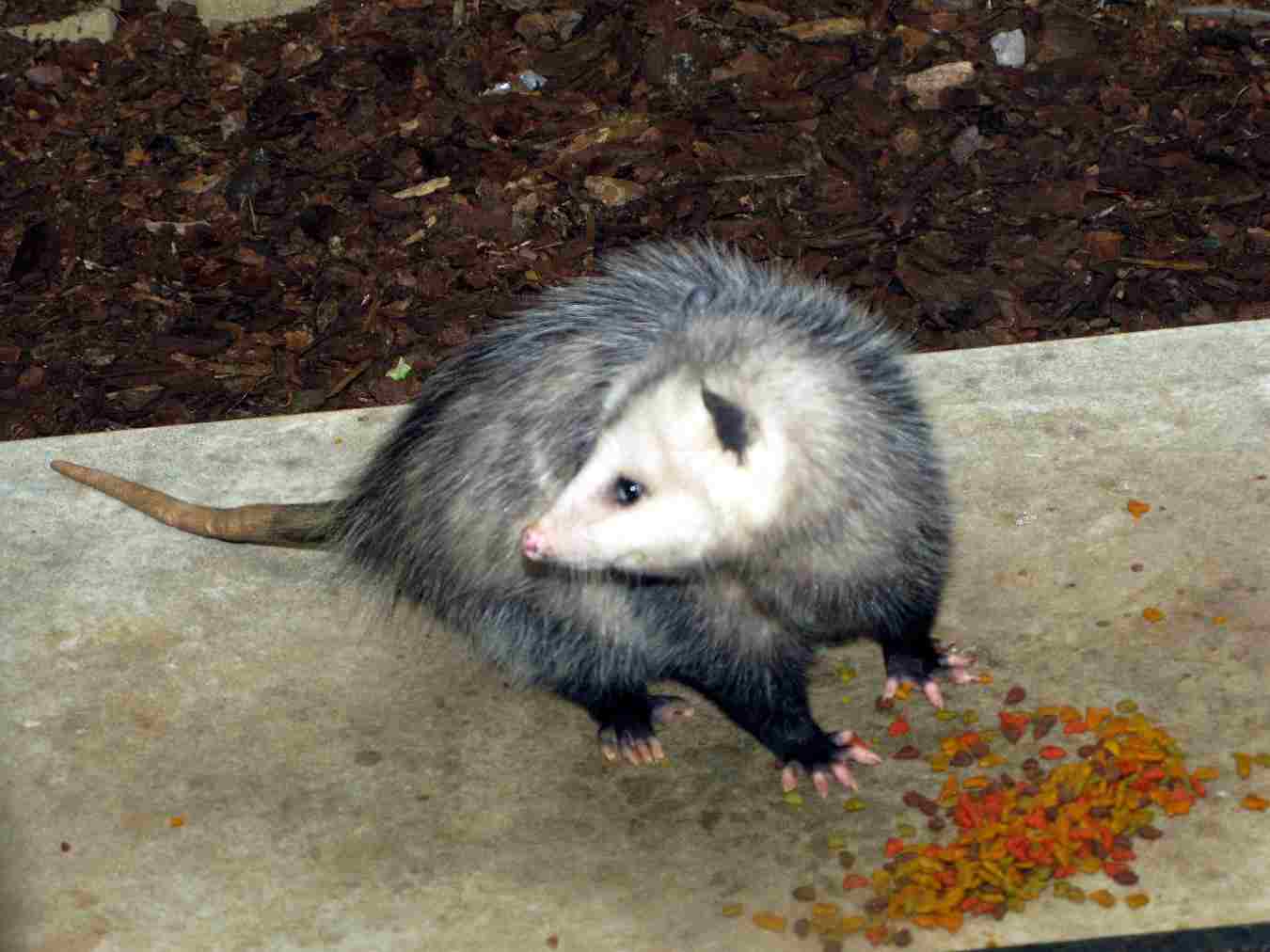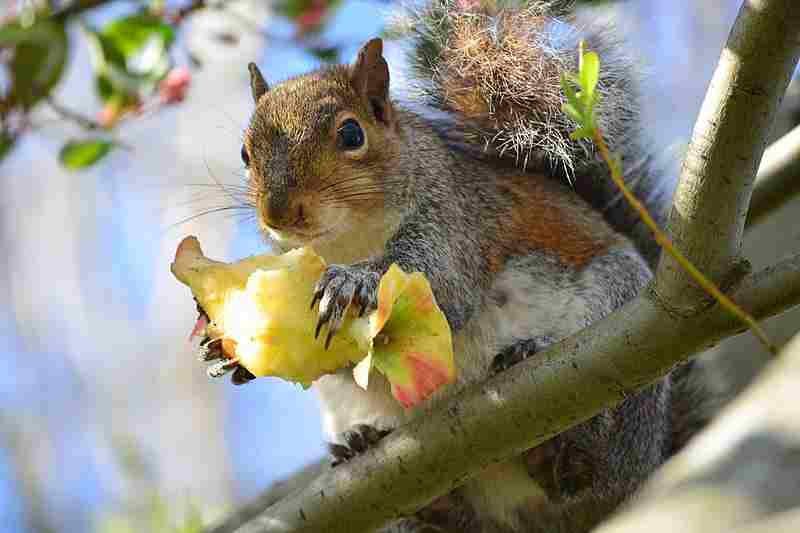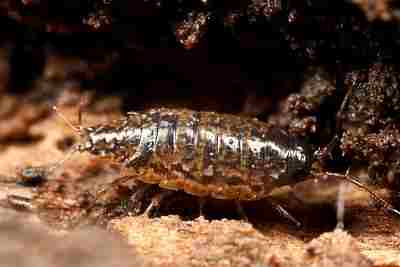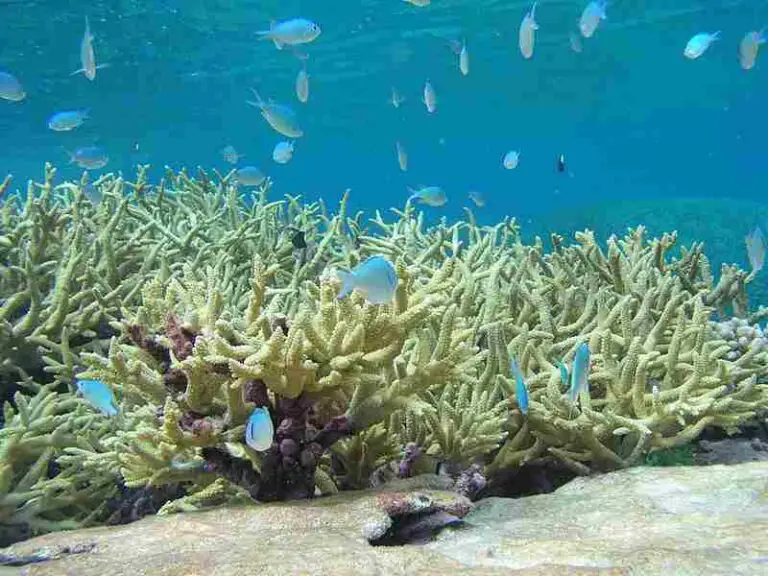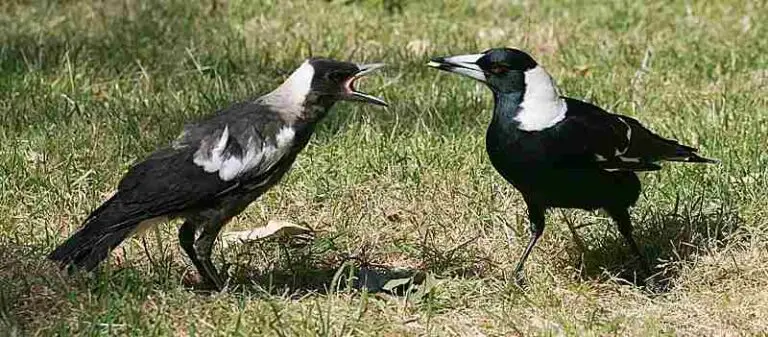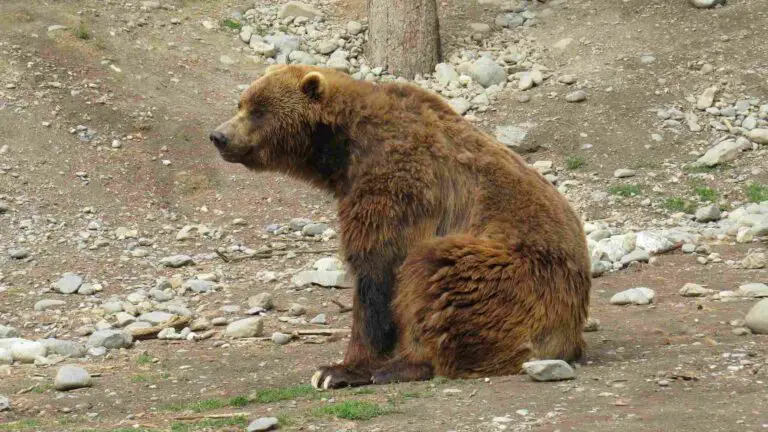Do Wasps Eat Meat? Ecologic Classification of Wasps
Yes, wasps do consume meat, particularly in their larval stage. While adult wasps primarily feed on nectar and other plant-based foods, they are also attracted to meat as a source of protein to feed their larvae. This carnivorous behavior is more pronounced in the larval stage, where they rely heavily on animal protein, including other insects and spiders. Additionally, certain species of wasps exhibit cannibalistic tendencies, especially among larvae, further highlighting their carnivorous nature.
Are Wasps Carnivores?
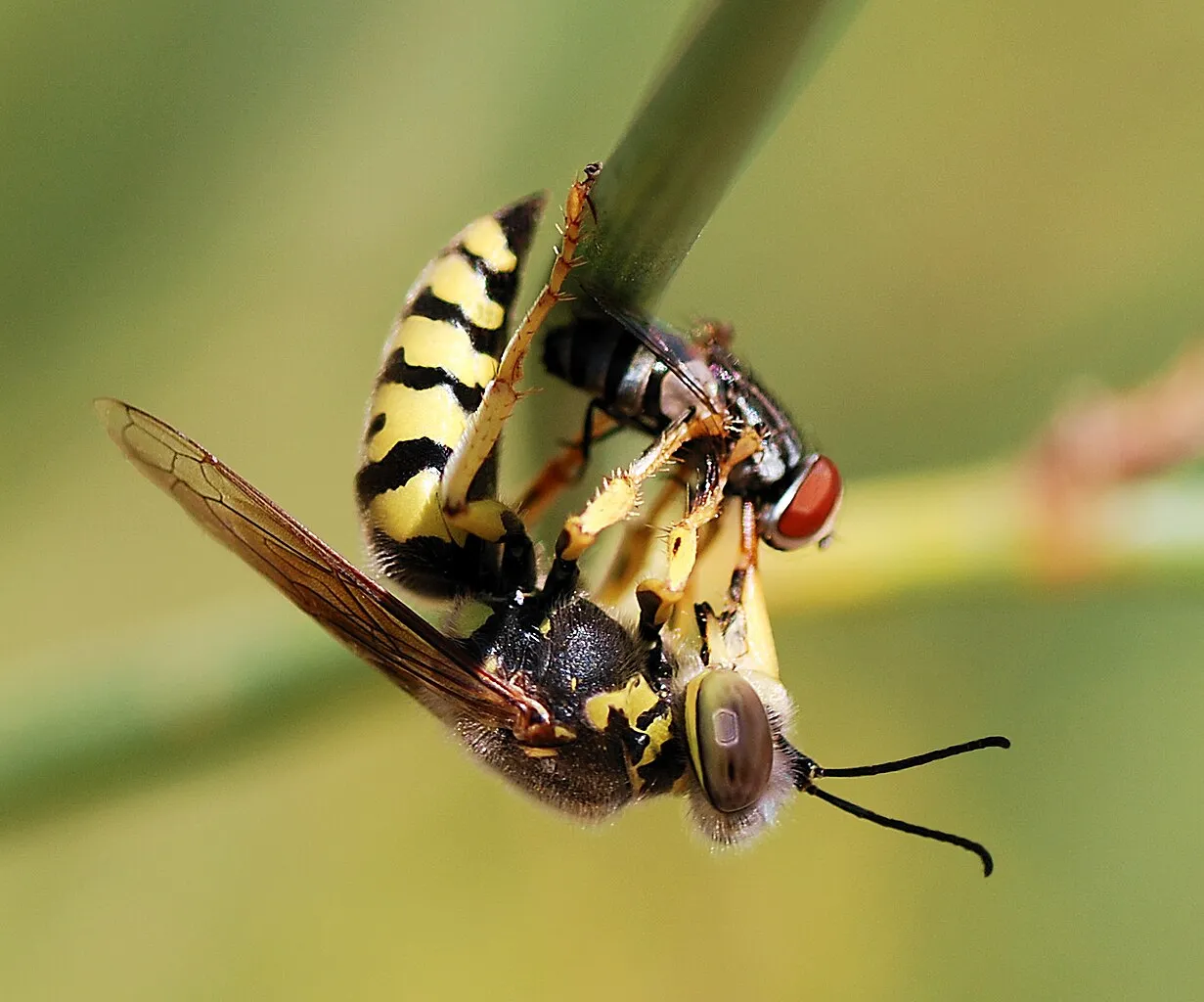
Yes, wasps can be considered carnivores, especially during their larval stage. While adult wasps primarily feed on nectar and other plant-based sources for energy, they also actively hunt for insects and spiders to provide protein for their developing larvae. This carnivorous feeding behavior is essential for the growth and development of the young wasps. However, it’s important to note that adult wasps may also consume meat, such as carrion or other animal matter, to produce protein-rich pellets to feed their larvae.
Reasons Why Wasps are Not Carnivores
Wasps are actually considered to be carnivores, especially during their larval stage. While adult wasps may predominantly feed on nectar and other plant-based sources, they actively hunt for insects and spiders to provide protein for their developing larvae. This carnivorous behavior is crucial for the survival and development of the young wasps. Therefore, it would be inaccurate to categorize wasps as non-carnivores.
Are Wasps Omnivores?
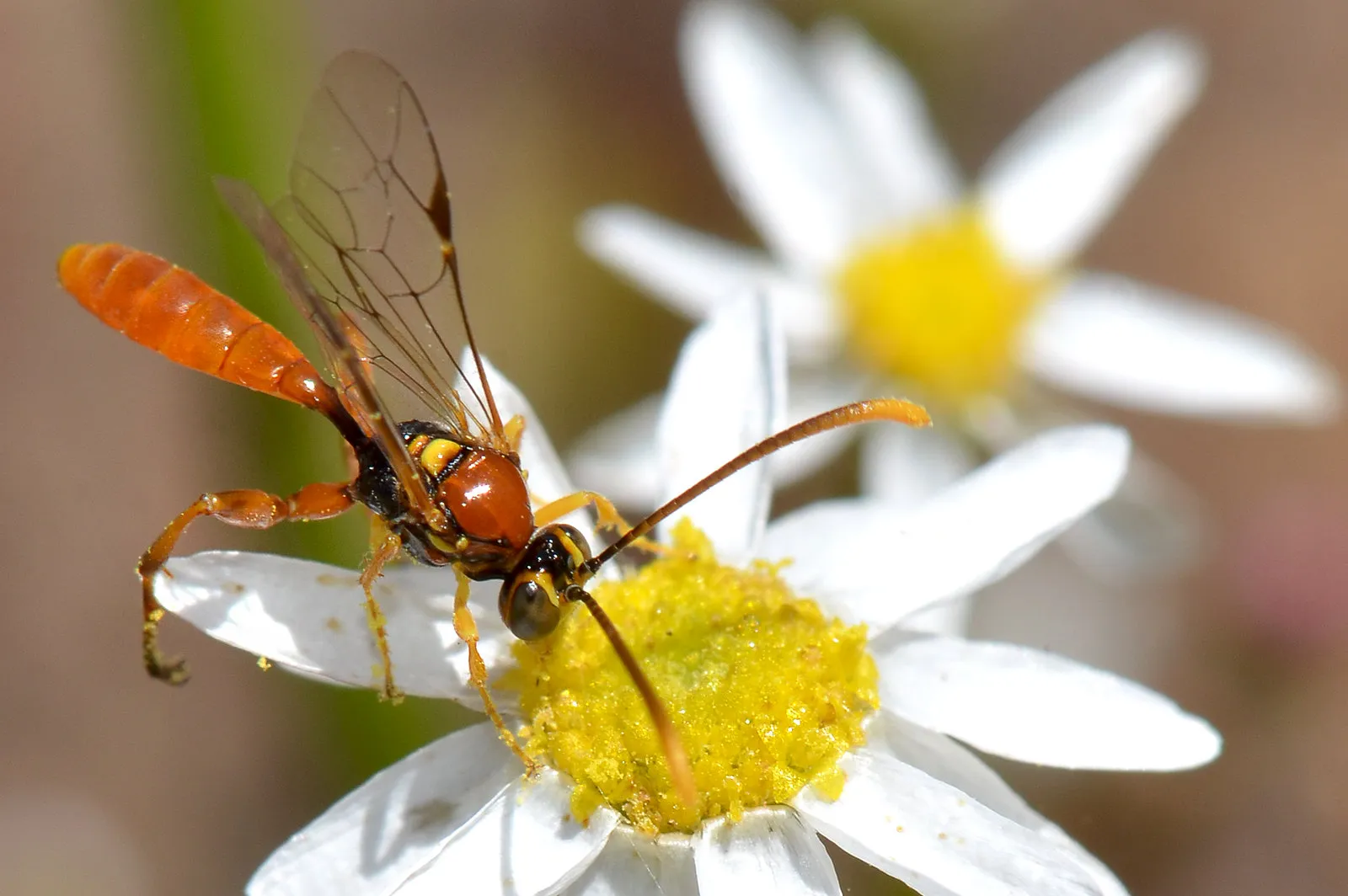
Yes, wasps can be classified as omnivores. They have a varied diet that includes both plant-based foods, such as nectar, and animal protein, which they obtain from hunting insects and spiders. While their primary source of energy may come from plant-based foods, their carnivorous behavior, particularly during the larval stage, demonstrates their ability to consume and digest both plant and animal matter. This adaptability to different food sources contributes to their classification as omnivores.
Reasons Why Wasps are Omnivores
Wasps exhibit omnivorous behavior due to their ability to consume both plant-based and animal protein-rich foods. While they primarily feed on nectar and other plant-based sources for energy, they also actively hunt for insects and spiders to provide protein for their developing larvae. This dietary flexibility allows wasps to adapt to different environmental conditions and food availability, making them efficient scavengers and predators in various ecosystems. Their omnivorous nature ensures their survival by allowing them to exploit a wide range of food sources.
Are Wasps Cannibals?
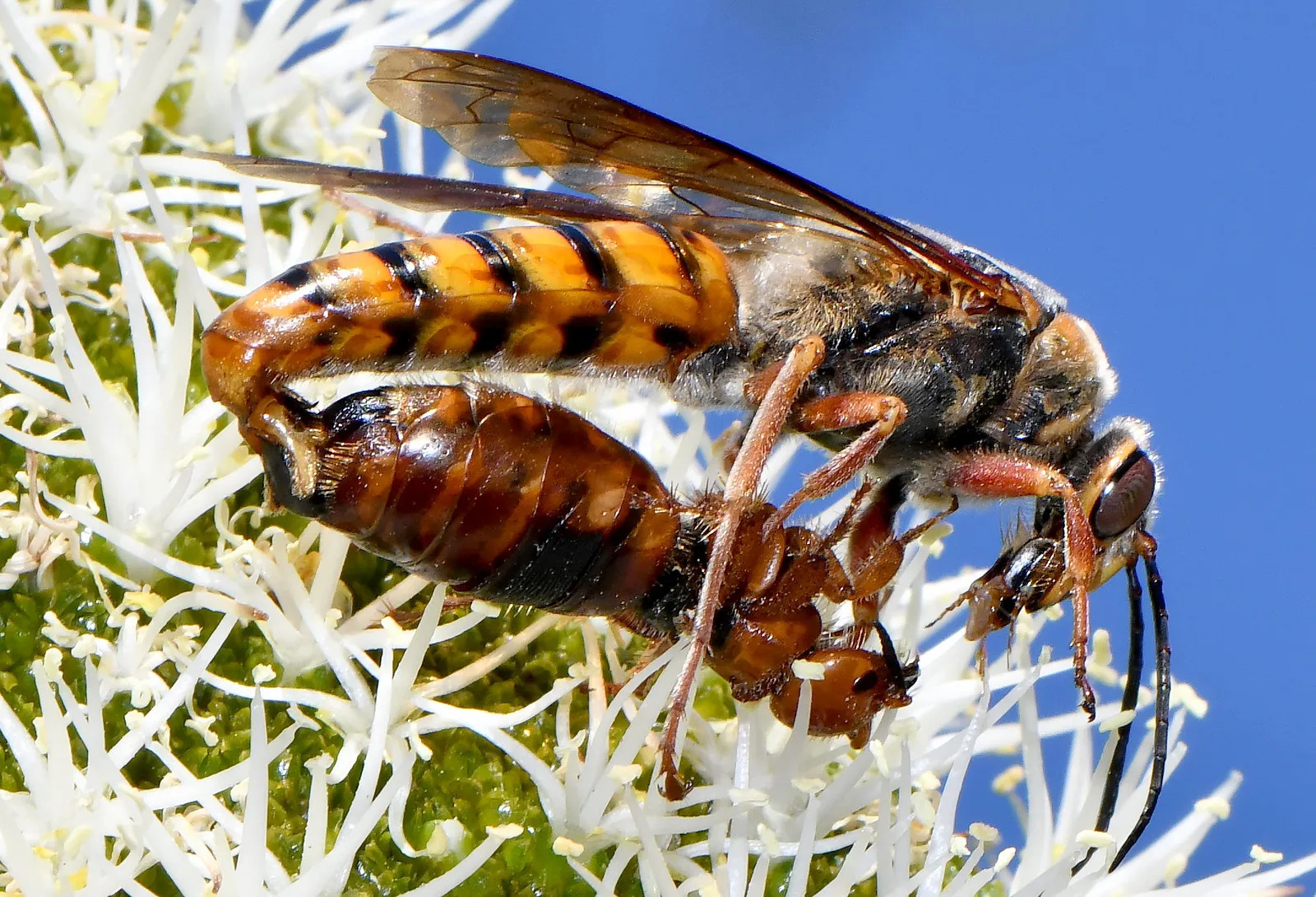
Yes, cannibalism does occur among wasps, especially among their larvae. In certain situations, when resources are scarce or competition for food is high, adult wasps may resort to cannibalistic behavior to ensure the survival of some larvae over others. Additionally, if a colony is in distress or facing a shortage of food, adult wasps may consume their own larvae as a last resort to sustain themselves. This cannibalistic behavior highlights the complex dynamics within wasp colonies and their ability to adapt to challenging circumstances.
Meat Eating Wasp Species
Several species of wasps are known for their carnivorous behavior, particularly in their larval stage. Some examples include:
-
Yellowjackets (genus Vespula and Dolichovespula): Yellowjackets are notorious for their aggressive behavior and are commonly attracted to meat and other protein-rich foods. They hunt insects and scavenge for carrion to feed their larvae.
-
Paper wasps (genus Polistes): Paper wasps are also carnivorous and feed on a variety of insects, spiders, and other small invertebrates. They actively hunt prey to provision their nests.
-
Mud daubers (family Sphecidae): Mud daubers are solitary wasps that construct mud nests. They are efficient hunters, capturing spiders and paralyzing them to provision their nests for their developing larvae.
These are just a few examples of meat-eating wasp species, showcasing the diversity of carnivorous behavior among different groups of wasps.
Do Wasps Like Raw Or Cooked Meat?
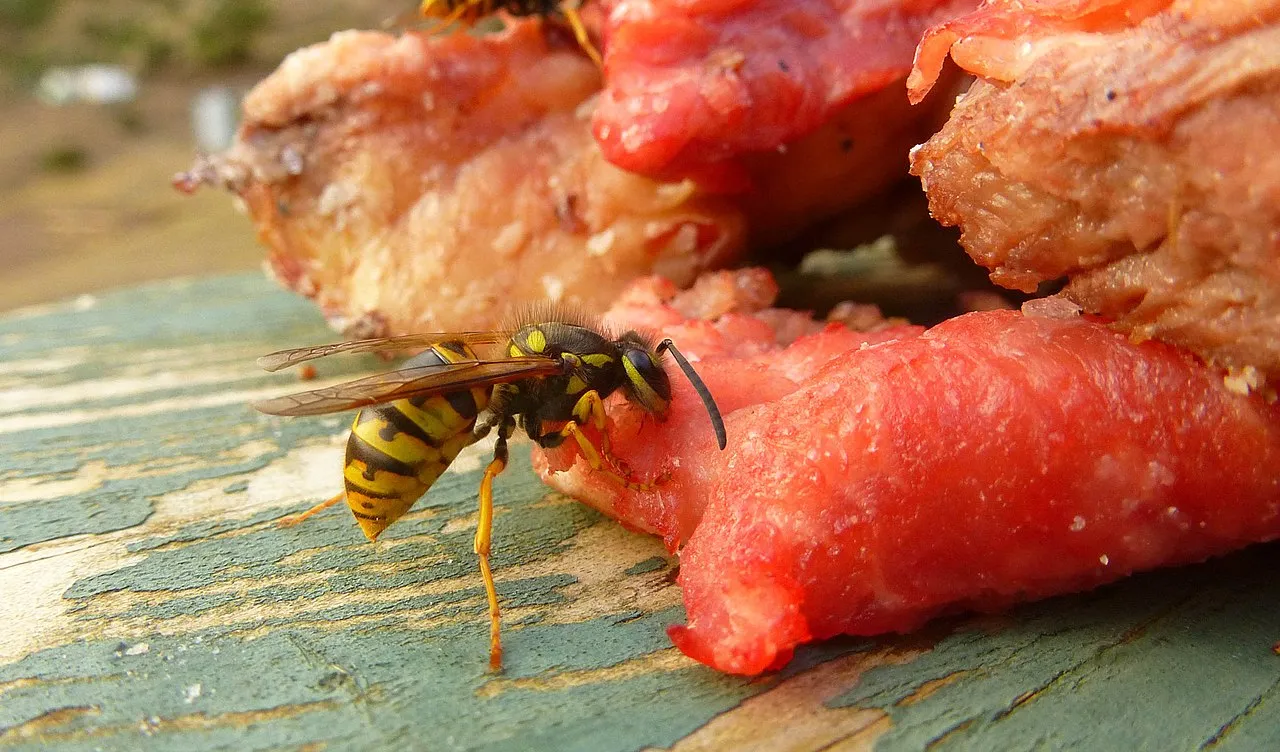
Wasps do not have a preference for raw or cooked meat. Their attraction to meat is primarily driven by the need to obtain protein to feed their larvae. Whether the meat is raw or cooked, it serves as a suitable source of protein for the development of the young wasps. However, wasps are more commonly found scavenging on raw meat, such as carcasses or prey they have captured themselves, as it is more readily available in nature.
Are Wasps Attracted To The Smell Of Meat?
Yes, wasps are attracted to the smell of meat, particularly when it is decomposing. The odor of decaying flesh contains chemical compounds that signal to wasps the presence of a potential food source rich in protein. Additionally, certain species of wasps are known to be attracted to the scent of fresh meat, such as the blood or bodily fluids of injured animals. This attraction to the smell of meat plays a crucial role in the foraging behavior of wasps, guiding them to potential sources of food for themselves and their larvae.
What Do Most Wasps Eat?
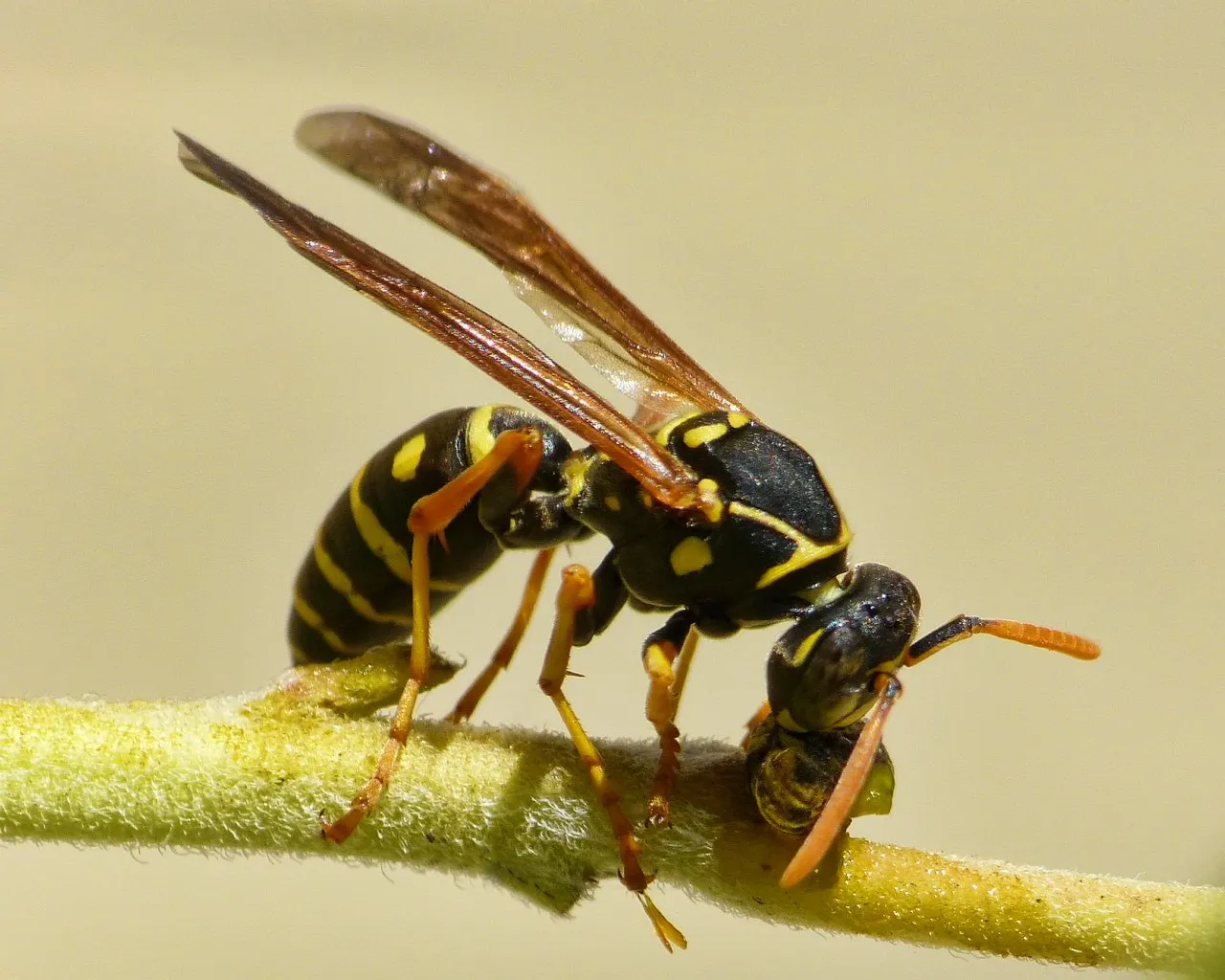
Most wasps have a varied diet that includes both plant-based foods and animal protein. As adults, they primarily feed on nectar from flowers, which provides them with the energy they need for flight and other activities. However, wasps also hunt for insects, spiders, and other small invertebrates to provide protein for their larvae. This carnivorous behavior is especially prominent during the larval stage, where the developing wasps require a high protein diet for growth and development. Additionally, some wasp species are attracted to carrion and other sources of meat, which they may scavenge to feed themselves and their young. Overall, the diet of most wasps reflects their omnivorous nature and their ability to exploit a wide range of food sources in their environment.
Do Wasps Eat Meat In the Winter?
During the winter months, when temperatures drop and food sources become scarce, wasps’ dietary habits may change. While they may still scavenge for carrion or other sources of meat if available, their primary focus shifts to survival rather than reproduction. In colder regions, many wasp species enter a state of hibernation or diapause, where their metabolic rate slows down, and they become less active. During this time, they rely on stored energy reserves rather than actively foraging for food. Therefore, while wasps may consume meat if it’s accessible, their overall dietary behavior during winter is influenced by factors such as temperature and food availability.
What Do Wasps Eat In Summer?
During the summer months, when food sources are abundant and temperatures are warmer, wasps maintain their omnivorous diet. They continue to feed on nectar from flowers to fulfill their energy requirements. Additionally, summer is a period of active reproduction for many wasp species, so they intensify their hunting behavior to gather protein-rich prey, such as insects and spiders, to feed their growing larvae. This increase in carnivorous activity ensures the successful development of the next generation of wasps. Overall, summer provides ample opportunities for wasps to exploit a variety of food sources to sustain themselves and their colonies.
Do Wasps Eat Bees?
Yes, certain species of wasps are known to prey on bees. For example, some species of paper wasps (genus Polistes) and hornets (genus Vespa) are notorious for attacking honeybee colonies. They may raid beehives to capture worker bees, which they then paralyze and feed to their own larvae. This predatory behavior can have significant impacts on bee populations and can pose a threat to beekeepers and agricultural activities reliant on bee pollination. Therefore, while not all wasp species prey on bees, some do exhibit this behavior as part of their carnivorous diet.
Do Wasps Eat Spiders?
Yes, many species of wasps are known to prey on spiders. Wasps are skilled hunters and often capture spiders to provision their nests for their developing larvae. They may sting the spider to immobilize it or inject it with venom to paralyze it before transporting it back to the nest. Once in the nest, the paralyzed spider serves as a food source for the wasp larvae, providing them with the protein they need for growth and development. This predatory behavior helps control spider populations and contributes to the ecological balance of various ecosystems.
Do Wasps Eat Meat Bones?
Wasps do not typically eat meat bones. While they are carnivorous and consume animal protein, they primarily target soft tissues of their prey, such as muscles and organs. Wasps are not equipped to consume or digest hard materials like bones. Instead, they focus on extracting the nutritious components from their prey, leaving behind the inedible parts. Therefore, wasps are unlikely to be attracted to meat bones as a food source.
Do Wasps Eat Protein?
Yes, wasps consume protein as part of their diet, particularly during their larval stage. Protein is essential for the growth and development of young wasps, so adult wasps actively hunt for insects, spiders, and other small invertebrates to provide protein-rich food for their larvae. Additionally, wasps may scavenge for carrion or other sources of meat to obtain protein. Their ability to obtain protein from various sources contributes to their overall survival and reproductive success.
Do Wasps Like Garlic?
There is no scientific evidence to suggest that wasps are attracted to or have a preference for garlic. Wasps primarily feed on nectar, other plant-based sources, and animal protein obtained from hunting insects and spiders. While some scents may attract wasps, such as the smell of meat or certain fruits, garlic is not typically considered an attractant for them. Therefore, it is unlikely that wasps have any particular interest in garlic.
Do Wasps Eat Honey?
Wasps are not primary consumers of honey. Unlike bees, which collect and store honey as their primary food source, wasps do not have the specialized adaptations for honey production or consumption. While some species of wasps may occasionally consume small amounts of honey if it’s available, they do not rely on it as a significant part of their diet. Instead, wasps primarily feed on nectar from flowers and hunt for insects and other small invertebrates to provide protein for their larvae. Therefore, while wasps may opportunistically feed on honey in certain situations, it is not a staple food for them.
Do Wasps Eat Ants?
Yes, certain species of wasps are known to prey on ants. Wasps are skilled hunters and may actively search for ant colonies to capture individual ants or raid the nests. They typically target ant workers, paralyze them with their sting, and carry them back to their own nest. Once in the nest, the paralyzed ants serve as food for the developing wasp larvae, providing them with protein for growth and development. This predatory behavior helps regulate ant populations and contributes to the ecological balance of various ecosystems.
Do Wasps Eat Flies?
Yes, many species of wasps are known to prey on flies. Wasps are skilled hunters and are attracted to the movement and odor of flies. They may actively hunt flies or scavenge on fly carcasses. Once captured, the wasps may sting the flies to immobilize them or inject them with venom to paralyze them before consuming them or bringing them back to their nest to feed their larvae. Flies are a common food source for many species of wasps, providing them with protein for growth and development.
What Yellowjacket Wasps Eat
Yellowjacket wasps, like many other wasp species, have a varied diet. They are opportunistic feeders and will consume a wide range of foods depending on availability. Yellowjackets are known to feed on a variety of insects, including flies, caterpillars, and other small invertebrates. They are also attracted to sugary substances such as nectar, fruit juices, and human food items like soda and sweets. Additionally, yellowjackets are scavengers and will feed on carrion, garbage, and other decaying organic matter. Overall, yellowjacket wasps are adaptable feeders capable of exploiting a diverse array of food sources in their environment.
*Summary
| Key Takeaways |
|
– Skilled hunters, targeting insects and spiders.
|
|
– Primarily feed on nectar for energy.
|
|
– Some species attracted to sugary substances.
|
|
– Also scavengers, consuming carrion.
|
|
– Important for regulating insect populations.
|
|
– Exhibit omnivorous behavior.
|
|
– Prey on ants, flies, and other insects.
|
|
– Do not typically consume bones or honey.
|
FAQs: What Are Wasps Attracted To In Humans?
- What scents attract wasps to humans?
- Wasps are attracted to various scents, including sweet-smelling perfumes, lotions, and hair products. They are also drawn to the scent of human sweat and body odor.
- Do bright colors attract wasps to humans?
- Yes, bright and floral-patterned clothing can attract wasps as they may mistake it for flowers, which they visit for nectar. Avoid wearing brightly colored clothing, especially yellow and white, when spending time outdoors in areas with high wasp activity.
- Are food and drinks attractive to wasps?
- Yes, wasps are attracted to food and drinks that humans consume, particularly sugary substances like soda, fruit juices, and sweet treats. They are also drawn to protein-rich foods like meat and fish.
- What should I do if I encounter a wasp?
- Remain calm and avoid making sudden movements. Slowly and quietly move away from the area without swatting at the wasp, as this may provoke it to sting. If a wasp lands on you, try to gently brush it off or remain still until it flies away.
-
Why do wasps sting humans?
- Wasps may sting humans in self-defense if they feel threatened or perceive humans as a threat to their nest or territory. Additionally, they may sting when disturbed or startled. It’s essential to avoid provoking wasps to minimize the risk of being stung.
